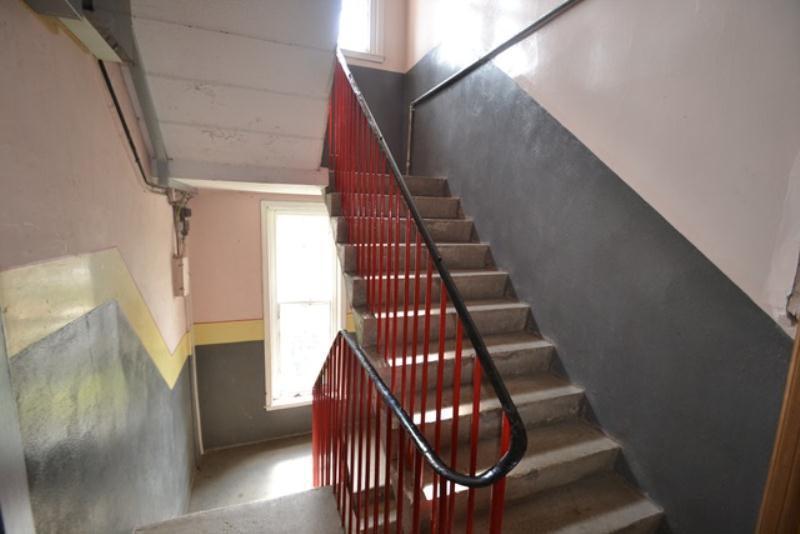- Home
- Scotland's changing climate
- Urban Housing in Scotland
- Maintenance
- Ventilation
- Airtightness
- Insulation
- Lofts - insulation at ceiling level
- Lofts - insulation at rafter level
- Cavity wall insulation
- Solid Walls: Internal vs External Insulation
- Internal Solid Wall Insulation (IWI)
- External Solid Wall Insulation (EWI)
- Timber frame retrofit
- Windows and doors
- Openings in 'historical' buildings
- Openings in 'non-historical' buildings
- Ground floors
- Suspended floors
- Suspended floors - from below
- Suspended floors - from above
- Solid floors
- Insulation materials
- Building science
- Space heating
- Solar energy
- Product Selector
Common stairs, repairs and responsibilities
Common stairs
If there is a common stair in the property, check:
• loose or missing balusters, which children could fall through; damaged or incomplete handrails
• uneven steps or problems with stair or floor surfaces that could be unsafe
• emergency lighting and any alarm system.

Common Responsibility
• External walls from the halfway point within the individual flat or close
• Foundations and damp-proof course
• Roof structure, slating, flashings, gutters and downpipes
• Services – as far as the branch into an individual flat
Individual Responsibility
• Anything serving only one property
• Windows (but individuals have a duty to maintain their windows on behalf of other owners)
• Doors to individual properties (usually flats)
• Chimney pots and cowls related to individual flues
• Font shop facades
• Plumbing connection from fittings to waste pipe
Mutual responsibility
• Anything owned by two or more owners and should be paid equally by all who use the part unless the title deeds say otherwise
• Chimneys – paid for by all those who have a use of the chimney
• Gable walls shared with an adjacent property (although hard to enforce)
• Close windows
• Close, close stair, pend and all owners who have use of access
• The floor between two flats is usually shared between the two flats.
Owner responsibility
• Each owner in a shared building is responsible for fully insuring and maintaining any part of that building that provides support and shelter and paying their share of any common maintenance where proper procedures have been followed.
• Each owner is also responsible for paying their fair share of any repair works, even if the property has been sold, if the works date to a time when they were living there.
• Each owner has a right to ask other owners for proof of insurance, arrange essential repairs, access a neighbour's property to carry out the repairs and recover the costs from others. Equally, each owner has the right to refuse to pay for repairs if they are non-essential or were not informed of the works. Further, they have the right to appeal decisions they did not agree with at the Sheriff's Court within 28 days.
• Owners normally decide by majority vote on what needs to be done, organising surveys, appointing contractors to carry out works and appointing property managers. They can also choose to organise common insurance and run a maintenance account.
Get agreement from your neighbours
It’s really important when undertaking common works to ensure that there is agreement as far as possible. Much more information is available from The Tenement Handbook and ‘Under One Roof’ website, which advises on various issues, including creating a regular maintenance schedule. Being as fully briefed as possible with professional and possibly legal guidance is important.